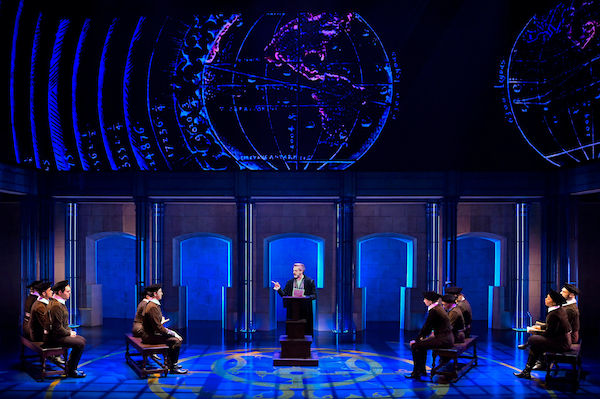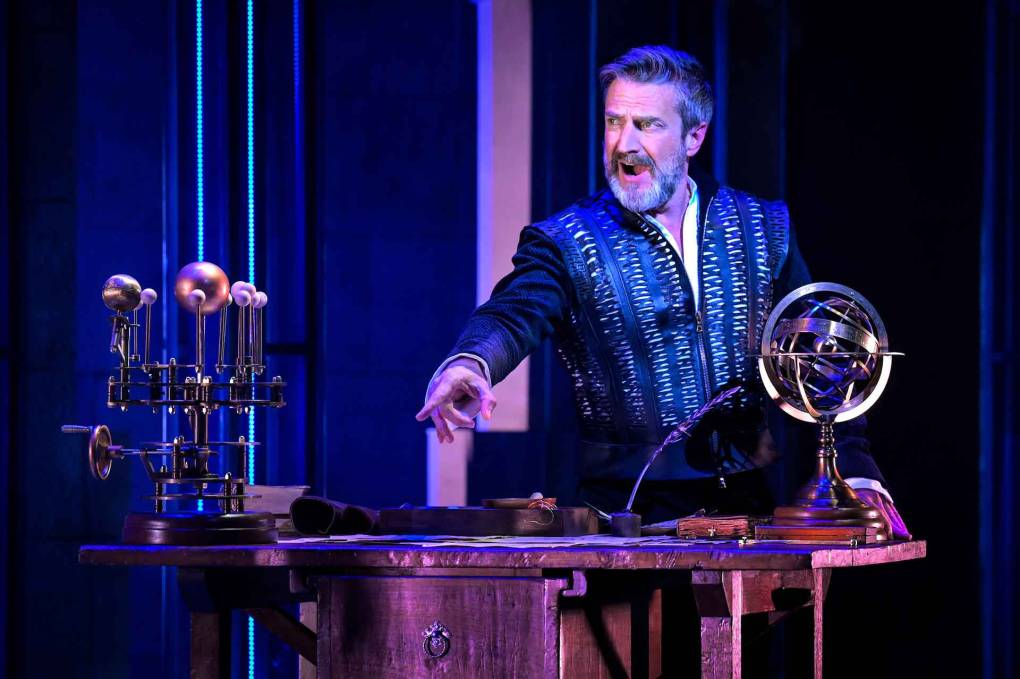
The fake news promoted by 16th century Rome’s ecclesiastic elites included harsh public denial of astronomer/physicist Galileo Galilei’s proof that the earth revolves around the sun, rather than vice versa.
The fake news promoted by the impresarios behind “Galileo: The Rock Musical,” now making its debut at the Berkeley Rep, is the assertion that their show makes insightful connections between the self-serving anti-intellectualism of power brokers during the Renaissance and in today’s world.
Maybe, after major rewrites. But for now, don’t believe the hype.
There are indeed interesting parallels between the Renaissance Catholic church’s efforts to stifle acceptance of Copernican theory and contemporary conservatives’ efforts to deny climate change; but “Galileo”’s creators- book writer Danny Strong and composer/lyricists Michael Weiner and Zoe Sarnak –don’t so much draw those parallels as jot them down on a scratchpad with little shading or subtlety, meanwhile focusing their attention on archaic arena rock melodrama.
The show needs more palpable stakes and less audible Styx.
Big ideas, minimized
Somewhere beneath its flashy, clangorous carapace beats a smart, well-intentioned heart. The creative team clearly sides with science. But in “Galileo”’s current incarnation, the songs are bloated with the rhetorical devices of today’s worst GOP stump speeches:
Incessant repetition of empty catchphrases (“Louder, louder; louder, louder”; “The power, and the glory; the power and the glory”) and bombastic delivery and MAGA-worthy lack of logic (“Maybe we could learn to fly/ Birds can fly”).
The juxtaposition of centuries old stories with relatively modern musical styles is by no means a new idea. Think of “Jesus Christ Superstar” and, more recently “Hamilton.”
Musically, “Galileo” has far more affinity with the former than the latter. But The Passion of Christ is a culturally and emotionally deep-seated narrative, needing only broad lyrical and melodic strokes to summon up an enormous backstory in listeners’ minds.
Like Colonial-era American politics, the Copernican theory and European political-theological power dynamics are not nearly as accessible to the average theatergoer as Bible tales.
Among the many reasons “Hamilton” was smart to use rap is the genre’s verbosity. Whether through lyrics, dialogue, or some combination, “Galileo” demands a significant increase in word count to excavate its buried nuances.
Further experimentation needed

Galileo Galilei is widely credited with establishing the scientific method, which demands the application of rigorous skepticism. Having offered such, my hope is that the powerhouse New York production team behind “Galileo” continues to bankroll director Michael Mayer’s experimentation with this potentially powerful material rather than rushing it to Broadway in a rough, unfinished state.
For the moment, though, there is glorious singing on offer.
In the title role, Tony-nominee Raul Esparza (The Rocky Horror Show, Cabaret,Company) broods and belts with an intimate clarity. Too bad that his most distinctive number, the vaudevillian “Two Sides,” will likely be cut, given its stylistic contrast with the anthemic Album Oriented Rock sound of virtually every other song.
Jeremy Kushnier, last seen locally in the pre-Broadway run of “Head Over Heels,” dazzles with crystal diction and a stunning falsetto in the role of Bishop Barberini, Galileo’s pal and ally who eventually becomes Pope, then turns on his old friend.
(It’s a hairpin turn, too, a poorly scripted flip-flop, convincing us that Power Corrupts no more effectively than would those two words crocheted on a throw pillow).
A large ensemble provides impassioned choral support that vibrates with soulfulness at a purely sonic level. Sometimes I found myself wishing the lyrics were in Latin, so I wouldn’t comprehend their silly oversimplicity.
